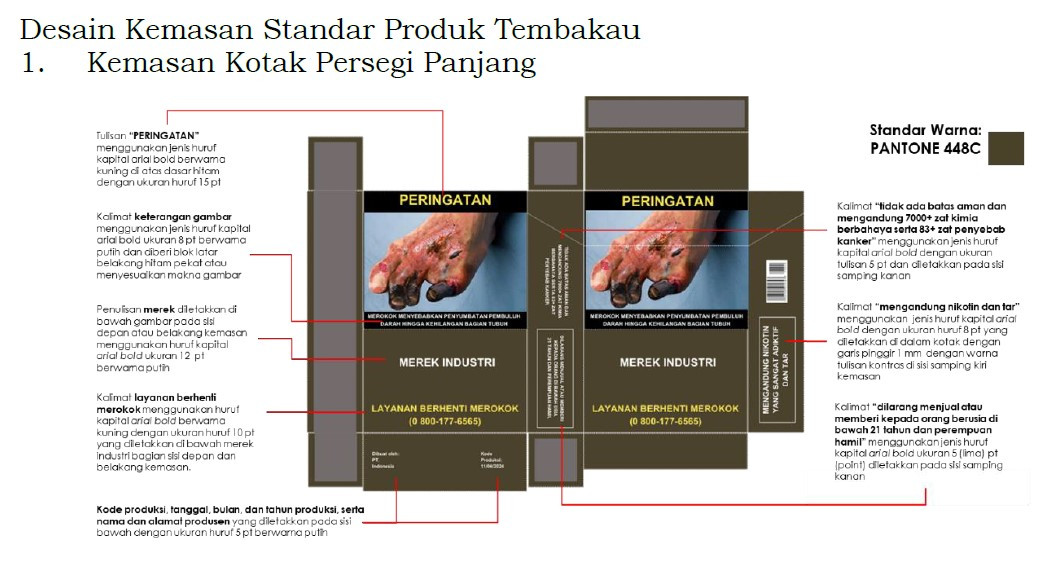News
Tobacco Industry Stakeholders Oppose Controversial Policies on Tobacco
Front Row (The Jakarta Post) September 27, 2024 Excerpt of the proposed plain packaging for tobacco products in the draft Health Minister Regulation (RPMK) that is deemed counterproductive to the national economy and workforce sustainability. (Health Ministry)
Excerpt of the proposed plain packaging for tobacco products in the draft Health Minister Regulation (RPMK) that is deemed counterproductive to the national economy and workforce sustainability. (Health Ministry)
Dozens of cross-sector associations stakeholders of the tobacco industry have voiced their opposition to various controversial policies related to tobacco product regulation as per Government Regulation (GR) No. 28/2024 and the draft Health Minister Regulation (RPMK) that serves as its implementing regulation, especially the health ministry’s plan to impose plain packaging for tobacco products and electronic cigarettes.
The regulations under their scrutiny include zoning restrictions on sales and outdoor advertising, as well as the proposal for standardized plain packaging for tobacco and electronic cigarettes. Tthose policies have led to controversy and uncertainty for businesses across various sectors.
Indonesian Employers Association (APINDO) Vice Chairman Franky Sibarani stated that the regulatory pressures on the tobacco industry are burdensome for sectors related to tobacco. As a commodity with significant contributions to the nation, APINDO believes the government needs to exercise caution in policymaking and consider Indonesia's unique socio-economic conditions.
In Indonesia, the tobacco industry supports millions of jobs from farmers, workers, traders and retailers to the creative industry. Therefore, APINDO stated that policymaking in Indonesia cannot be solely based on practices from other countries without considering local cultural contexts.
“We feel that there are issues in the policy-making process for both GR 28/2024 and the RPMK due to minimal involvement of the industry. This will lead to prolonged contractions. Policymakers should be cautious in issuing regulations that could threaten prolonged contractions,” Franky said in an official statement during a press conference on GR No. 28/2024 and the RPMK at APINDO's office in Jakarta on Sept. 11.
At the event, Indonesian Unfiltered Cigarette Manufacturers Association (GAPPRI) Chairman Henry Najoan praised APINDO’s efforts to accommodate all aspirations and respond effectively to the grievances of the tobacco industry. GAPPRI emphasized that the tobacco industry is not just a business but a significant economic and cultural chain.
“The proposal for plain packaging in the RPMK will have serious impacts, as it exacerbates already excessive policies and could lead to a contraction in state revenue and employment. Therefore, we firmly reject this regulation,” Henry said .
Henry also agreed with the government on not selling tobacco products to children, as GAPPRI has committed to preventing underage tobacco sales. GAPPRI said it has adhered to national regulations and maintained its commitment to preventing youth smoking, so these new rules will negatively affect the entire tobacco industry chain.
Indonesian Ventilated Cigarette Producers Association (GAPRINDO) Chairman Benny Wachjudi highlighted that the tobacco industry has been burdened by various regulations. Despite being an industry with externalities, the tobacco industry has complied with regulations and adhered to regulations, particularly regarding excise duties, which remain a significant source of state revenue, contributing up to 10 percent, or more than Rp 200 trillion.
Benny also noted that the current excise policies have already put a lot of pressure to the industry every year. With GR 28/2024 and the RPMK, the detrimental impact to the industry will be even greater. The industry has already been under pressure from excessive policies, and minimal industry involvement in formulating the zoning restrictions and plain packaging regulations will worsen the situation.
“If the process is flawed, the content will undoubtedly be problematic. GR 28/2024 still contains issues that need re-evaluation, including the 200-meter sales restriction, advertising, and the more concerning aspect of plain packaging regulations that remove brand identity and encourage illegal cigarettes,” he said.
National Tobacco Farmers Association (DPN APTI) Secretary-General Kusnasi Mudi said that restrictive policies on tobacco in GR 28/2024 and the RPMK are a shared problem. Not only the industry but also tobacco farmers are affected as a crucial upstream component of the tobacco industry. These regulations, he continued, are seen as neglecting the central role of tobacco in agriculture as a high-value crop that supports 2.5 million livelihoods.
“We are very disappointed and object to the derivative regulations being drafted in the RPMK due to the lack of coherence between the government and the tobacco industry. Tobacco is one of the national strategic commodities, but our existence is continually suppressed. We request government protection for the 2.5 million farmers who are also struggling for their livelihoods and facing various other issues,” he explained.
Similarly, Federation of Tobacco, Food and Beverage Workers Unions of Indonesia (FSP-RTMM-SPSI) Chairman Sudarto condemned GR 28/2024 and the RPMK. Both regulations, he said, are seen as discriminatory products due to minimal participation and the lack of facilitation for workers to voice their concerns.
“The government needs to recognize that workers are assets and that we are numerous; we should not be continuously marginalized. One aspect that needs attention is that workers are part of Indonesia’s constitution, and in the eyes of the law, we are equal. It is important to remember that we are a tobacco-producing country and should not be compared with consumer countries,” he added.

